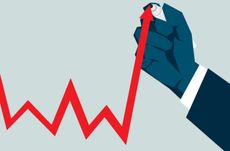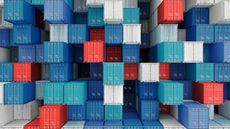Kiplinger’s Business Spending Outlook: Investment to Weaken as Global Economy Slows
Corporate borrowers will also need to trim capital spending as banks tighten credit.
- (opens in new tab)
- (opens in new tab)
- (opens in new tab)
- Newsletter sign up Newsletter


Kiplinger's Economic Outlooks are written by the staff of our weekly Kiplinger Letter and are unavailable elsewhere. Click here for a free issue of The Kiplinger Letter or for more information.
Business spending, especially on capital equipment, will be dinged this year, both because of an uncertain economic outlook, and because bank lending has tightened in response to the troubles in the banking sector. Banks and other lenders recognize that they are under greater scrutiny these days, and so will tend to be more cautious about lending.
Labor costs will continue to rise at a faster-than-usual pace this year. Annual wage growth should ease from 5% now to about 4% as the economic slowdown reduces hiring, but will still be above the normal 3% rate. Wage growth will remain elevated in areas of continuing labor shortages, such as health care, and in the Southern states and Texas, where large in-migration has increased demand for services.

Sign up for Kiplinger’s Free E-Newsletters
Profit and prosper with the best of expert advice on investing, taxes, retirement, personal finance and more - straight to your e-mail.
Profit and prosper with the best of expert advice - straight to your e-mail.
Prices of some materials, such as copper and steel, have been rising because of expectations that China’s demand will rise in the future. China’s economic growth was expected to strengthen after the lifting of COVID-19 restrictions, but the slowing in Western economies is reducing demand for China’s exports. The outlook for copper prices is an advance back to near-record prices this year, as a cut in Chile’s production makes it unlikely that low world inventories of the metal can be replenished. But steel prices are likely to move sideways, as China’s manufacturing sector and nonresidential building are still weak.
Some qualified good news for electric-vehicle battery makers: The prices of lithium and cobalt — two raw materials needed for EV batteries — have dropped rapidly this year, but that’s because battery production has outpaced demand.
Demand for semiconductors has tanked in the consumer electronics sector, so these types of chips are in abundant supply as a result. But the availability of automotive and some other specialty chips is still limited. Chips for computers and phones are in surplus as demand wanes, but microcontroller and automotive chips still face shortages. Ramping up production takes time, as factories take years to build. Another problem: Like most complex industrial machinery, chipmaking equipment requires chips, too. In short, expect limited supply for much of this year in the areas where shortages still exist. But if a recession happens, the remaining shortages would likely ease.
Sources:
- Census Bureau, Durable Goods Report (opens in new tab)
- Census Bureau, Business Inventories (opens in new tab)

David is both staff economist and reporter for The Kiplinger Letter, overseeing Kiplinger forecasts for the U.S. and world economies. Previously, he was senior principal economist in the Center for Forecasting and Modeling at IHS/GlobalInsight, and an economist in the Chief Economist's Office of the U.S. Department of Commerce. David has co-written weekly reports on economic conditions since 1992, and has forecasted GDP and its components since 1995, beating the Blue Chip Indicators forecasts two-thirds of the time. David is a Certified Business Economist as recognized by the National Association for Business Economics. He has two master's degrees and is ABD in economics from the University of North Carolina at Chapel Hill.
-
-
 Why You Should Teach Your Kids Investing
Why You Should Teach Your Kids InvestingPutting money in the stock market is one of the best ways to build wealth in America. That's why it is so important for parents to teach their kids investing.
By Kyle Woodley • Published
-
 10 Ways to Prepare Your Home for Summer Weather
10 Ways to Prepare Your Home for Summer WeatherHot summer weather can take a toll on your home if you're not prepared. Follow these tips to make sure you're ready for the season.
By Daniel Bortz • Published
-
 SpaceX in Good Shape Despite Test Flight: Kiplinger Economic Forecasts
SpaceX in Good Shape Despite Test Flight: Kiplinger Economic ForecastsEconomic Forecasts SpaceX in good shape despite test flight concerns: Kiplinger Economic Forecasts.
By John Miley • Published
-
 Virgin Orbit Failure Casts Cloud Over Space Voyages: Kiplinger Economic Forecasts
Virgin Orbit Failure Casts Cloud Over Space Voyages: Kiplinger Economic ForecastsEconomic Forecasts Virgin Orbit failure casts a cloud over space voyages but SpaceX could fill the void.
By Letter Editors • Published
-
 TikTok Ban Winners and Social Media Changes: Kiplinger Economic Forecasts
TikTok Ban Winners and Social Media Changes: Kiplinger Economic ForecastsEconomic Forecasts TikTok Ban winners, LinkedIn changes: Kiplinger's analysis of the massive social media cross-platform shake-ups.
By Letter Editors • Published
-
 Shortage of electrical engineers to power labor market growth: Kiplinger Economic Forecasts
Shortage of electrical engineers to power labor market growth: Kiplinger Economic ForecastsEconomic Forecasts A lack of skilled graduates and funding are contributing to the shortage.
By David Payne • Published
-
 AI Regulation is Looming: Kiplinger Economic Forecasts
AI Regulation is Looming: Kiplinger Economic ForecastsEconomic Forecasts Find out what Washington and regulators have planned for artificial intelligence.
By John Miley • Published
-
 Kiplinger's Retail Outlook: Consumers Are Still Resilient
Kiplinger's Retail Outlook: Consumers Are Still ResilientEconomic Forecasts Kiplinger's Retail Outlook: Sales this year are likely to be mostly stable, even as the economy slows.
By David Payne • Last updated
-
 Kiplinger Inflation Outlook: Rising Prices To Ease Soon
Kiplinger Inflation Outlook: Rising Prices To Ease SoonEconomic Forecasts Kiplinger inflation outlook: inflation will drop in the next few months, but price pressures remain in the services sector.
By David Payne • Last updated
-
 Kiplinger's Trade Outlook: U.S. Trade Deficit Narrowed Sharply in March
Kiplinger's Trade Outlook: U.S. Trade Deficit Narrowed Sharply in MarchEconomic Forecasts Exports won’t provide much boost to U.S. GDP this year.
By Rodrigo Sermeño • Last updated









